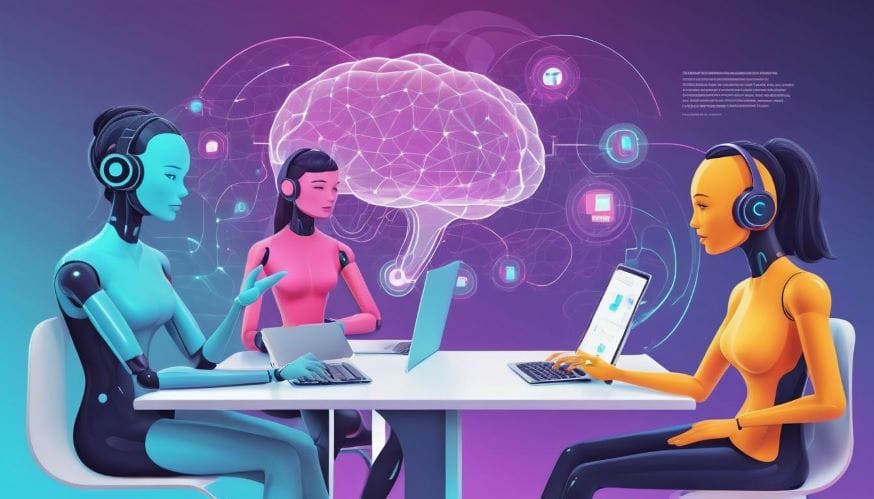Transforming Chat Room Experiences with AI and Intelligence
In the age of instant communication, we’ve all experienced the thrill of engaging in conversations in chat rooms. However, sometimes it can feel like navigating through a maze, especially when questions go unanswered or information is hard to find. That’s where chatbots come into play! These digital helpers are changing the way we interact online by providing quick responses and facilitating lively discussions. With their growing presence, chatbots not only enhance the user experience but also streamline interactions, making chat rooms more dynamic and enjoyable for everyone involved. Let’s dive deeper into how these clever tools are reshaping our virtual conversations.
Using chatbots in chat rooms enhances user interaction by providing immediate responses or just giving someone to chat to, automating tasks, and facilitating engagement through multi-bot conversations. They contribute to a more interactive environment by assisting users in navigating discussions, providing relevant information promptly, and maintaining context during ongoing chats.
Why Character-Driven Bots Work
- Human-Like Interaction:
- They simulate real personalities, making conversations feel more relatable and engaging.
- Memorability:
- Unique characters stand out, creating a lasting impression on users.
- Emotional Connection:
- Users often develop a bond with character-driven bots, enhancing loyalty and trust.
- Enhanced Engagement:
- Humor, quirks, and personality traits keep users interacting longer.
- Tailored Experiences:
- Characters can be designed to fit specific roles or niches (e.g., a helpful doctor, a funny friend).
- Entertainment Value:
- They’re fun to use, turning mundane tasks into enjoyable interactions.
- Brand Alignment:
- A character bot can reflect a brand’s tone and values, creating a cohesive identity.
- Versatility:
- Whether used for customer service, gaming, or education, characters make interactions more dynamic, and can be used as a moderation assistant as well as dialogue
Integration of Chatbots into live Chat Rooms
Integrating chatbots into chat rooms isn’t an overnight process; it requires thoughtful consideration and strategic implementation. One of the critical first steps to successful integration is understanding the specific needs of our chat room environment. For instance, do we require automated responses for common queries, or should the chatbot provide more dynamic content like real-time updates? Each application can greatly vary based on its purpose and audience dynamics.
We at World of Chat thought we would create a lot of funny characters to sprinkle onto our pages, to keep people engaged when our chat room is empty.
Our bot is created with https://trypromptly.com/ which is a great free place to create bots, however, it does take a lot of work to complete this.
Please try chatting with our bot and test it out.
Technical Aspects of a Chat Bot: Infrastructure Considerations
The technical backbone of chatbot integration often involves leveraging API (Application Programming Interface) connections. This means our bot will communicate with established chat room platforms like Slack, Discord, or Microsoft Teams. Think of APIs as bridges; they allow different software programs to talk to each other seamlessly.
Security plays a significant role here because we need to establish authentication protocols that ensure all data shared between the chatbot and the platform remains protected. Just as a home needs secure locks, our integrations require strong safeguards against unauthorized access.
Without these robust security measures, sensitive information exchanged within chat rooms could be exposed, undermining user trust and safety.
User Experience
Let’s consider a practical example: imagine a gaming chat room where users thrive on up-to-the-minute stats. In this scenario, a chatbot can act as an immediate source of information for players, delivering real-time updates on game scores and server statuses without any delay. This helps create a more immersive environment where participants feel engaged in their experience, rather than waiting for human moderators to provide essential information. It’s about enhancing interaction, allowing users to get what they need instantly.
Enhancing Work Automation
The automation capabilities of chatbots can’t be overstated; they offer immense potential to streamline repetitive tasks like welcoming new members or moderating content within the chat room. However, this process does require meticulous programming to ensure that bots can accurately identify inappropriate content. If not programmed correctly, we risk letting problematic messages slip through the cracks or falsely flagging harmless contributions. Therefore, balancing automation with human oversight is crucial in maintaining a positive chat environment that feels both safe and welcoming.
Having explored how chatbots enhance interaction and streamline operations in chat rooms, we now turn our focus to the broader implications as we continue unravelling the evolving landscape of user engagement.
Enhancing User Interaction with Empathy
One of the most exciting aspects of integrating AI chatbots in chat rooms is their ability to create a dynamic and interactive environment. By leveraging sophisticated algorithms in Natural Language Processing (NLP) and Machine Learning (ML), these chatbots analyze user inputs, grasp context, and respond in a way that feels almost human. This capability transforms the traditionally static nature of conversation into a lively exchange that captivates users.
Imagine logging into a chat room where friendly prompts greet you by name, instantly making you feel welcome. It’s this kind of personalized touch that keeps users engaged and coming back.

Personalized User Experience
Personalized interactions are vital for establishing meaningful connections. With chatbots equipped with Natural Language Understanding (NLU), they can interpret the nuances of human language, learning from our preferences over time. This is not merely about addressing someone by their first name; it involves recognizing emotions or sentiments within messages.
For instance, if we express frustration about a service, an AI chatbot can detect this tone and respond accordingly, perhaps offering an apology or escalating the matter to a human operator. However, creating such a nuanced experience requires extensive initial coding and continuous adjustments as user dynamics change.
Beyond personalization, another fascinating aspect is how these chatbots can liven up conversations even further.
Interactive Games and Quizzes
Gamifying interactions through chatbots also turns mundane chats into engaging experiences. They can initiate games or quizzes to spark competition among users, reminiscent of trivia games found on platforms like Facebook Messenger.
Picture this: a chatbot prompts us with trivia questions about current events or pop culture while allowing us to compete against friends in real time. As we chase scores, the excitement builds, leading to increased interaction—not only with the bot but between users themselves as well. This interactive element fosters community spirit and invigorates discussions.
Finally, let’s not overlook how these integrations can streamline user needs and inquiries efficiently.
Streamlined User Support
AI chatbots excel at managing common inquiries swiftly and efficiently. Consider our typical customer support scenario—users often come with similar questions: “How can I reset my password?” or “Where can I find my order history?” Instead of waiting for a human representative to respond to each query individually, chatbots provide instant replies, effectively minimizing wait times.
This not only enhances user satisfaction but also frees up human agents to tackle more complex issues that require emotional intelligence or problem-solving skills beyond the chatbot’s capabilities.
As we examine the transformative impact of these technologies on our online experiences, it’s essential to understand the key advantages they offer across various platforms

Key Benefits of Using Chatbots
One of the most compelling benefits of implementing chatbots in chat rooms is task automation. By automating repetitive tasks, we free up valuable human resources to focus on more complex issues. Just imagine a scenario where routine questions about store hours or account status are handled automatically by a chatbot; this not only boosts efficiency but also ensures that our audience gets timely responses without unnecessary delay.
Efficiency and Speed
According to a recent report by Gartner, chatbots can manage up to 80% of basic customer inquiries without requiring human intervention. This remarkable capability leads to significantly faster response times and a smoother user experience. When we’re able to resolve inquiries almost instantly, it enhances user satisfaction and encourages continued interaction.
Consider, for instance, a busy e-commerce environment during a holiday sale. When traffic spikes and shopper inquiries multiply, chatbots can seamlessly handle thousands of requests at once. We gain the ability to maintain operational flow even when demand surges, ensuring that not a single question goes unanswered.
Consistency in Responses
Another key advantage is the consistency chatbots offer in their responses. Unlike human moderators who may inadvertently give varying answers based on mood or context, chatbots provide standardized replies. This uniformity helps build trust with users as they know they will receive accurate information every time they engage with the bot. Moreover, by maintaining this level of reliability, we reinforce our brand’s image as dependable and professional.
In my experience, this consistent communication reduces confusion among users seeking information about products or services. For example, if we’re running a promotional event, having a chatbot convey clear details about dates and discounts removes ambiguity and keeps everyone well-informed.
Scalability
Scaling operations has long been a challenge for businesses, particularly during peak times. Human agents face limitations in how many customers they can interact with simultaneously. In contrast, chatbots can effortlessly expand their capacity to serve an increasing number of users—handling hundreds or even thousands at once without breaking a sweat.
This scalability allows us to cater to global audiences across different time zones without compromising service quality. During an international product launch or significant marketing campaign, chatbots ensure that no potential customer is left waiting or frustrated due to high volumes of inquiries.
Yet, while these advantages showcase the remarkable capabilities of chatbots in enhancing user interactions, it’s essential to consider potential hurdles that might arise in their implementation.
Overcoming Challenges
While chatbots bring many advantages to our digital conversations, navigating the obstacles they pose is crucial for fostering a seamless user experience. One significant challenge is that of misunderstandings. Often, users may phrase their questions in ways that lead to confusion or misinterpretation by the chatbot. This isn’t just a minor irritation; it can derail entire conversations. By incorporating continuous machine learning enhancements, we can minimize these misunderstandings over time. Chatbots can be trained with diverse datasets that encompass varied phrasing and contexts, allowing them to better understand user intent based on previous interactions. It’s much like having a conversation with a friend who learns your quirks and responds more accurately as you chat more often.
Yet, while addressing misunderstanding is important, we should also concentrate on safeguarding user data to ensure trust in our systems.
Ensuring data privacy is not merely a checkbox in our chatbot development checklist; it’s a fundamental requirement that shapes the confidence users have in our technology. Users must be assured their interactions are secure from prying eyes or unauthorized access. Utilizing end-to-end encryption methods is a solid step to protect user data during transmission. This means that only the user and the intended service provider can read the messages exchanged, effectively shielding sensitive personal information from potential breaches.
Beyond encryption, we must implement transparent privacy policies and adhere to regulations such as GDPR, reassuring users that their data isn’t mishandled but rather treated with respect.
With these considerations in mind, understanding the various functionalities and capabilities of chatbots can guide us towards overcoming these hurdles effectively.
By embracing advancements in Natural Language Processing (NLP) and incorporating features such as context awareness and personalized interaction history, we enhance chatbots’ understanding and responsiveness. This evolution not only addresses misunderstandings but also cultivates a superior customer experience, helping ensure that users feel understood and valued rather than frustrated by erroneous interactions.
As technology continues to innovate, our approach toward challenges should adapt accordingly—ensuring that as we grow in capabilities, we also prioritize clarity and security. The dual focus on effective communication and robust data protection paves the way for sustainable chatbot engagement moving forward, ultimately enriching the digital conversation landscape for all involved.
This exploration of challenges lays the groundwork for understanding the various forms these intelligent systems can take, illuminating their unique roles across different settings.
What technological advancements are driving the use of AI Bots?
Technological advancements such as natural language processing (NLP), machine learning algorithms, and integration with artificial intelligence are significantly driving the use of chatbots in chat rooms. These technologies enable chatbots to understand and respond to user inquiries more accurately and contextually. For instance, a report from Gartner highlights that by 2025, 75% of customer interactions will be powered by AI-driven chatbot solutions, showcasing a rapid adoption of these technologies for enhanced user engagement.
How effective are chatbots compared to human moderators in managing chat room interactions?
Well a chat bot will never sleep unlike a human.
Chatbots are highly effective in managing chat room interactions, often outperforming human moderators in terms of response speed and consistency. According to a 2023 study, chatbots can handle up to 80% of common queries without human intervention, allowing human moderators to focus on more complex issues. Additionally, they operate 24/7, ensuring continuous engagement and support, which can enhance user satisfaction and retention rates by as much as 40%. This combination of efficiency and availability makes chatbots a valuable asset in modern digital communication environments.
Are there any privacy concerns when using chatbots in chatrooms?
Yes, there are privacy concerns when using chatbots in chat rooms. Users often share personal information, and if chatbots are not properly secured, this data can be vulnerable to breaches. According to a report by Cybersecurity Ventures, cybercrime damages could reach $10.5 trillion annually by 2025, highlighting the risk of inadequate data protection. Additionally, many users may not be aware that their interactions with chatbots could be recorded or analyzed for insights, raising issues about consent and the ethical use of their data.





